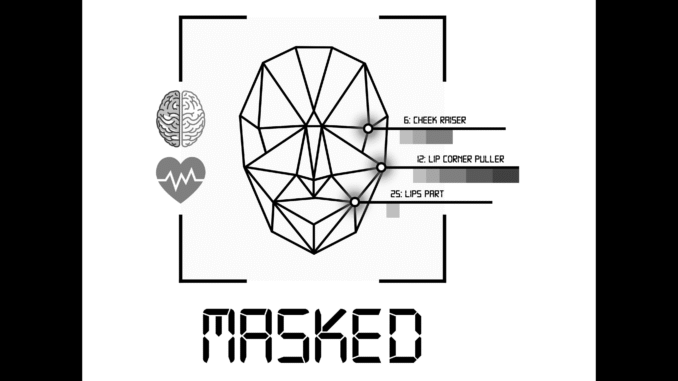
Motor Health and Semiotic Function in the Kinesthetic Expressivity of Neurodegenerative Disease (MASKED) by Devon Schiller (University of Vienna) and Brian Khumalo (University of Florida).
Abstract: Motor Health and Semiotic Function in the Kinesthetic Expressivity of Neurodegenerative Disease (MASKED) is a transdisciplinary applied research project grounded in cutting-edge biosemiotics. The principal aim is to address Parkinson’s disease, its symptomatic hypomimia (“facial masking”), and the ever-increasing technological demand for early-indicating detection techniques. Through interdisciplinary, international, and intersectoral secondments, researchers will train in world-leading measurement techniques, including the Facial Action Coding System (FACS) and the Neuropsychological Gesture Coding System (NEUROGES), and world-leading measurement technologies, including iMotions’s Affectiva and Noldus’s FaceReader. In this novel advancement of an applied semiotics that harnesses objective, quantitative methods, MASKED will apply the statistical analysis of empirical laws to scientific measurements of nonverbal behavior. To generate statistical models and interpret semiotic meanings, the project considers the medico-scientific ethics and multi-perspectival values behind the hypomimic sign and its signification across environmental contexts and lived experiences. Both correlational methods and conceptual models play equally critical roles. The objective of MASKED is to develop innovative solutions for noninvasive symptom assessment based on quantifiable differences between healthy and Parkinsonian faces, one face to another, and one face to itself over time. These solutions will have not only long-term applicability across diagnostic, prognostic, and therapeutic disease stages, but also wide-reaching utility across provider, caregiver, and patient treatment stakeholders. The hope with the MASKED project is to improve patient-health outcomes and mitigate socio-economic burdens among families, communities, and societies affected by PD and related chronic, progressive illnesses.
This project is funded by the Horizon Europe / Marie Sklodowska-Curie Staff Exchange under Grant Agreement No. 101236781
Keywords: Applied Biosemiotics, Automated Facial Behavior Analysis, Empirical Laws, Facial Expressivity, Health Semiotics, Neurodegenerative Disease
Devon Schiller, MA is a biological, cognitive, and medical semiotician. Currently, Schiller is a doctoral candidate in the Department of English and American Studies at the University of Vienna, Austria, studies for which he was awarded a DOC Fellowship from the Austrian Academy of Sciences. Schiller received a MA, Advanced in new media art history from Danube University in Krems, Austria in 2017 and a BFA in art history and studio painting from the Kansas City Art Institute in Missouri, United States in 2013.

To advance his expertise in the semiotics of the face, he trained in the Facial Action Coding System (FACS) at the University of California, Berkeley, United States and at I&G Management in Milan, Italy, as well as in the Neuropsychological Gesture Coding System (NEUROGES) at the German Sports University Cologne, Germany. In addition, he conducted grant-supported research on automated facial behavior analysis at the Fraunhofer Institute for Integrated Circuits in Erlangen, Germany and on the forensic science of facial reconstruction at the Forensic Anthropology Center at Texas State University, in San Marcos, Texas, United States. His research is published in Biosemiotics, Chinese Semiotics Studies, Cybernetics and Human Knowing, the International Journal of Semiotics and Visual Rhetoric, The MIT Press’s Leonardo, Sign System Studies, and Transactions of the Charles S. Peirce Society, among other journals and volumes. He presently is preparing an edited volume Signs, A Woman’s View: Victoria Welby and Welbyian Significs, which he is co-editing with Susan Petrilli (University of Bari Aldo Moro, Italy) in the Women in the History of Philosophy and Sciences book series (Springer Nature, 2026), and a monograph Face Time: A Biosemiotic Pragmatism of Facial Chronometry in the Biosemiotics book series (Springer Nature, 2027). His scholarship centers around the pragmatist semioethics of psychological science. In particular, his research focuses on dynamic human facial behavior, its modelling, and measurement in the equipped cognition of epistemic practices across contemporary and historical psychology.
Brian Khumalo, MSocSci is an anthropologist and biosemiotician. Currently, Khumalo is a doctoral candidate in the Anthropology Department at the University of Florida in Gainesville, Florida, United States. Khumalo received a Master’s in Anthropology from Rhodes University in Grahamstown, South Africa in 2022, studies which he completed as an Erasmus+ Mobility Researcher at the University of Lille, France. Khumalo received a joint BA in Anthropology and Jurisprudence, also from Rhodes University, in 2018.

He has primarily studied cooperation in the management of freshwater fisheries resources among recreational fishers using ethnography and game theory. He has worked on similar environmental research projects in South Africa, Tanzania, Seychelles, and the Solomon Islands, that had been supported by the Global Challenges Research Fund in the United Kingdom, Belmont Forum in Australia, National Research Foundation in South Africa, and National Science Foundation in the United States, among other funding agencies. As a biosemiotician, he regularly collaborates with primatologists to better understand non-linguistic communication, focusing primarily on facial and gestural behavior. He is also interested in meaning-making as a core component of the extended evolutionary synthesis, having published on this topic in journals including Phenomenology and the Cognitive Sciences and Biosemiotics. His research lies at the intersection of cognitive anthropology and human ecology, specifically in understanding cultural cognition as it relates to environmental management and decision-making.
Moderator:
Monica Rector (Rio de Janeiro)
Panel:
Michael W. Mair (Timaru)
Daria Arkhipova (Torino)
Roman Esqueda (Mexico)
Panchanan Mohanti (Hyderabad)
Evripides Zantides (Cyprus)
Marc Mehu (Vienna)
Elena Pegolo (San Francisco)


Be the first to comment